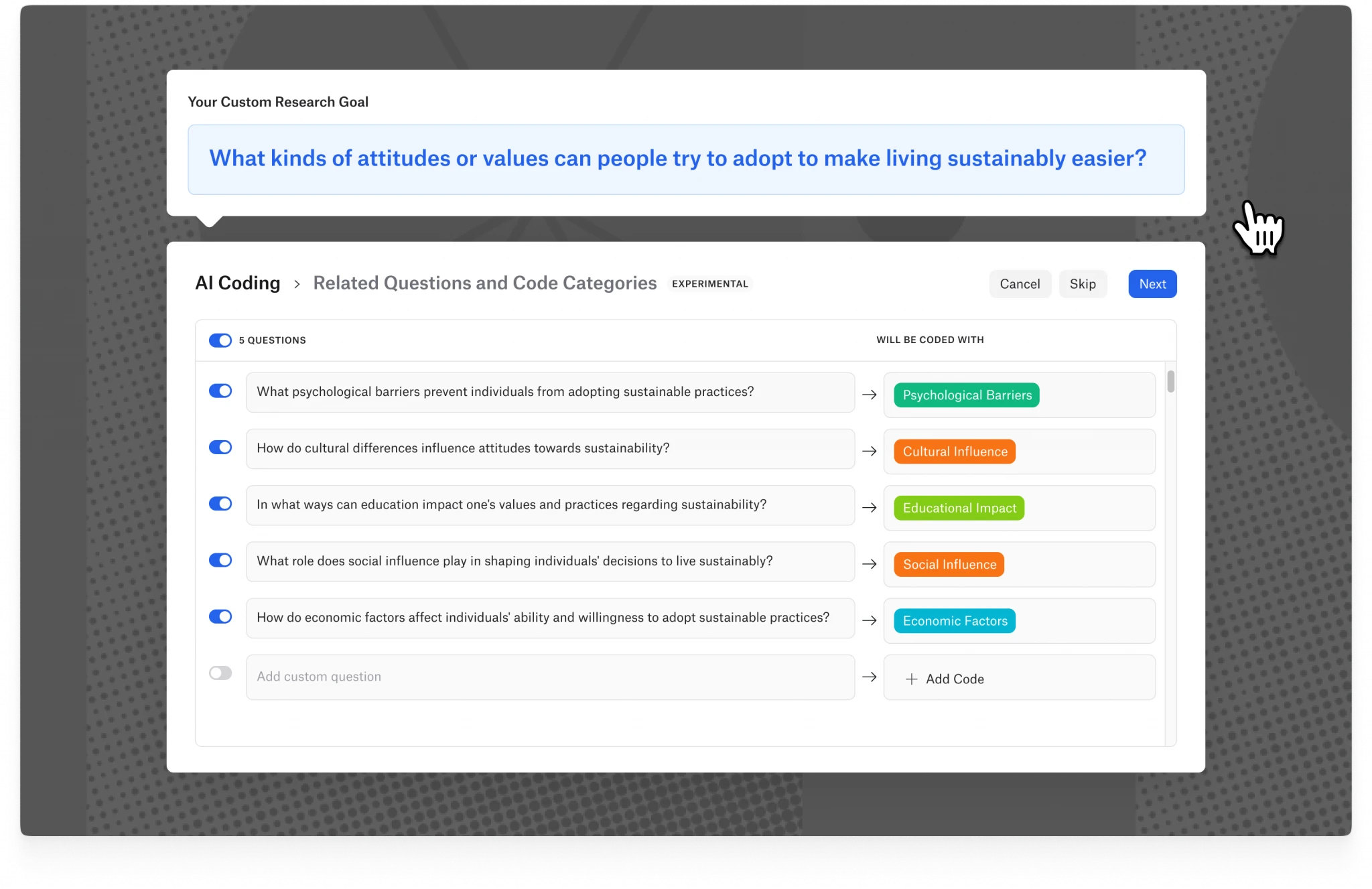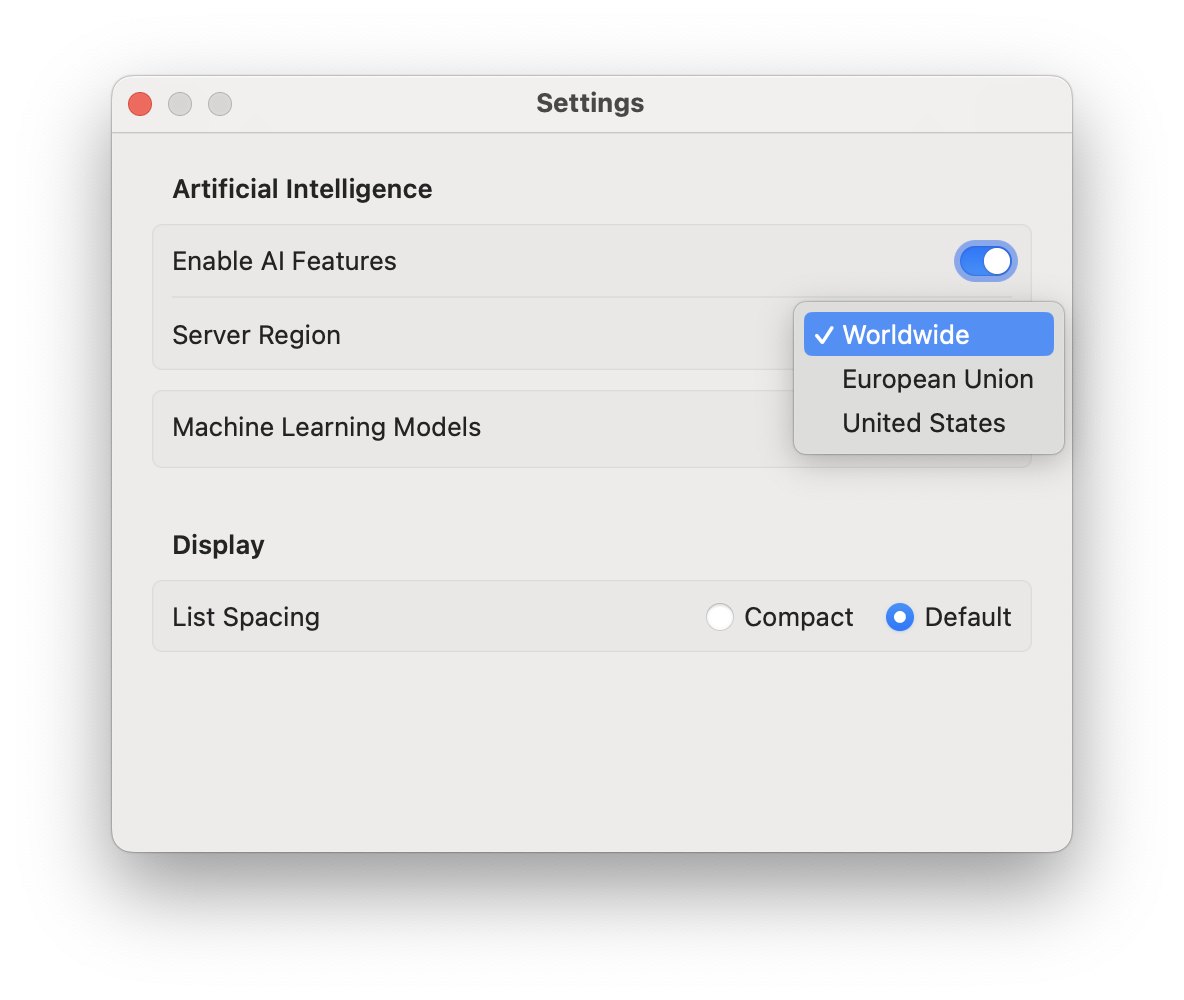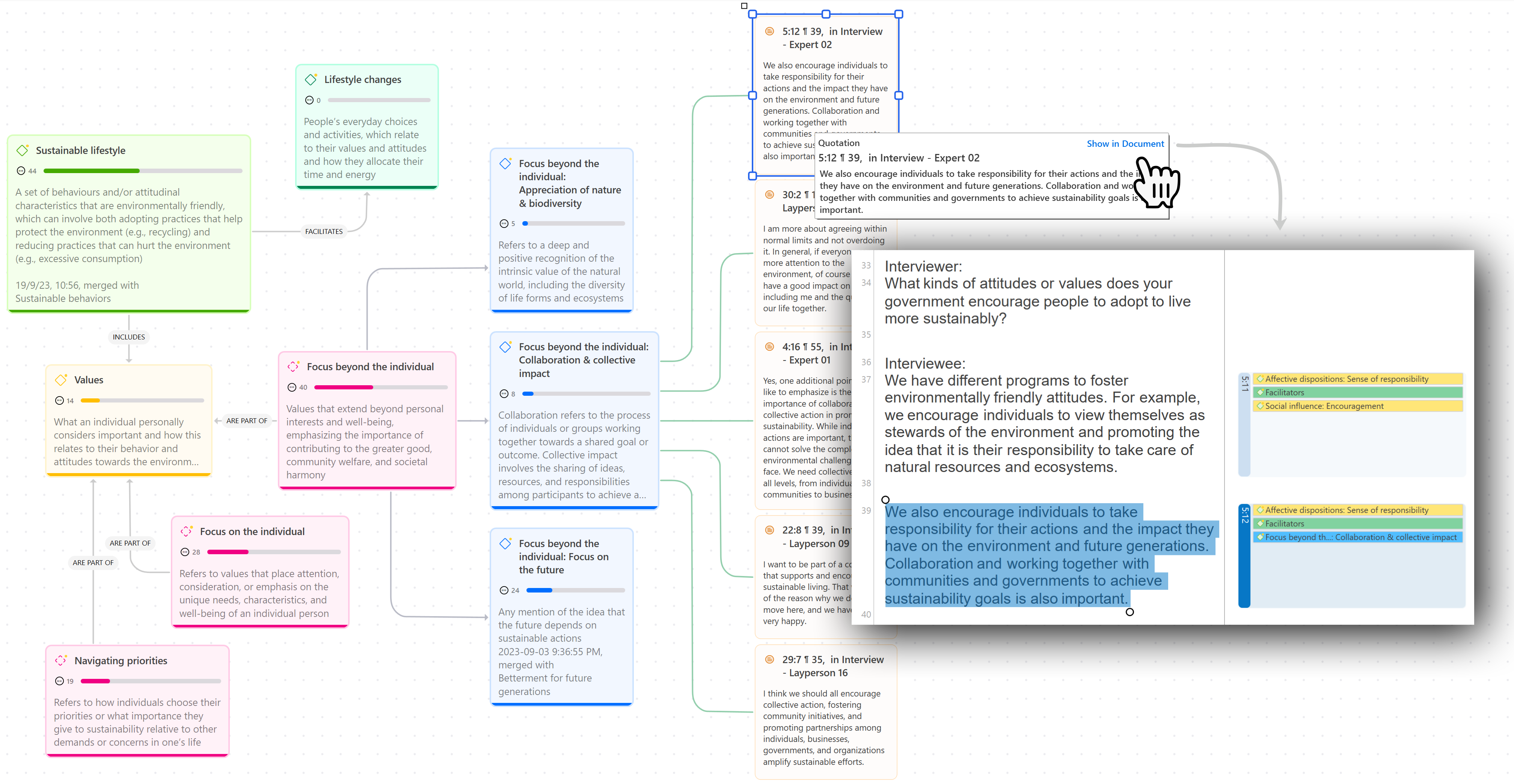AI in Qualitative Research: What have we learned, and where do we go from here?
The growth of AI in research
Over the course of just one year, artificial intelligence (AI) tools have been vastly improved to be more powerful, flexible, and accessible to researchers around the world. This has opened exciting possibilities as well as important questions regarding how AI can be responsibly and usefully utilized.
ATLAS.ti has been at the forefront of creating innovative and free AI tools, embarking on a journey to bring AI to qualitative researchers everywhere. Through this journey, we have learned a great deal about addressing researchers’ most pressing concerns and supporting their core needs. ATLAS.ti serves as a cockpit for researchers, offering a comprehensive overview and control, ensuring that researchers can always check the intentions guiding AI analyses, review and edit any coded results, and instantly see any data quotation in its original document. This ability to check the exact data and full context behind any AI analysis results is crucial.
In this article, we reflect on the past year of AI in qualitative research to take stock of what we’ve learned and share key insights on how researchers can harness AI for rigorous research, with ATLAS.ti acting as their command center.

AI tools for qualitative researchers
There are various AI tools and functionalities integrated into ATLAS.ti that cannot be found elsewhere, such as Intentional AI Coding, general AI Coding, and fine-tuning AI results. With Intentional AI Coding, researchers can guide how the AI will code their data by specifying their research questions and providing key contextual information. As always, researchers can instantly access the exact data and context supporting the AI results. Let Intentional AI Coding and Conversational AI become your assistant with ATLAS.ti! Imagine effortlessly extracting key insights driven by your intentions and having a friendly chat with your documents.
ATLAS.ti was the first qualitative research software to offer AI-driven coding, and we have been developing and integrating AI tools for over a year now and offering all these tools for free to all ATLAS.ti users. The development of these tools was not a simple process. Before they became what they are today, hundreds of research intentions were transformed into numerous prompts and sent individually to the AI. Each response was checked for its quality and appropriateness, and the prompt was then adjusted and sent again to closely related areas of the AI's n-dimensional "brain". This process was repeated until we achieved optimal results. We then implemented this algorithm in the software to obtain the best outcome with every query, leading to the precise and unique analytical possibilities that AI coding in ATLAS.ti offers today.
Researchers can also chat with their documents (i.e., ask natural language questions and receive answers based on the data), summarize any text (e.g., all quotations associated with one or several codes) and receive AI-driven code suggestions when highlighting any segment of text (i.e., creating a quotation) in ATLAS.ti. In fact, generating AI summaries, code suggestions, and chatting with your documents is already widely available and accessible with the basic resources of ChatGPT. While other qualitative research software has also implemented these AI functionalities, they have done little more than add these low hanging fruits of AI into their software.
In contrast, the ATLAS.ti AI Lab has carefully crafted a whole host of AI-driven tools that extend far beyond the default capabilities of ChatGPT by pushing ourselves to meet the challenges posed by qualitative research. As already mentioned above, we have achieved the development of both general and Intentional AI coding, including the fine-tuning of AI through categories as well as the implementation of AI data residency regions. This progress is attributed to our state-of-the-art architecture and the substantial efforts and expertise of our developer-researchers. They possess a deep understanding of and dedication to fulfilling research needs and are continuously enhancing the performance of our AI algorithms. At ATLAS.ti, our team’s unwavering commitment and spirit fuel our mission to deliver software that significantly benefits every user and thus makes a significant difference. And more is to come.
As ATLAS.ti has been continuously innovating AI tools for qualitative research, the time is ripe to take the next steps in developing AI tools that can support rigorous research. Our extensive experience with developing AI tools and rich conversations with users have taught us that AI can help researchers engage with their data. Still, a key concern for ensuring rigor and precise individual analysis tailored to the researcher is maintaining control over the process and having transparency in how the AI analyzes the data. And at this point, ATLAS.ti comes into play. The foundational functionality of ATLAS.ti, combined with Conversational AI and Intentional AI Coding, makes this aspect actionable. Integrating these AI tools into ATLAS.ti enables researchers to unpack the black box of AI.

Giving researchers access to the data behind any AI results
A core benefit of qualitative research software is that it maintains fluid connections between all the parts of a research project. Researchers can add codes in their documents, write notes in memos, visualize connections in networks, and more. In ATLAS.ti, all entities are dynamically interrelated and accessible to researchers. Importantly, no matter where in their project researchers are working, the data behind any part of the analysis can quickly be accessed. All data always remains embedded in its context: By simply double-clicking on a data quotation, researchers can open the original document.
Thus, a key element of ATLAS.ti is access to the data behind the AI results because every entity is an own object in ATLAS.ti, which ensures a seamless connection between the individual parts of a research project. Every data quotation and every code is directly accessible and can be contextualized in the original document. This functionality in ATLAS.ti was originally programmed by Thomas Muhr, the inventor and owner of the software, and this allows researchers to view each element – whether it's a code, a quotation, or a memo – in its original context, exactly where it was created.
This interconnectedness makes it easy for researchers to access and review any results from AI analyses. Researchers can edit any of the results, including combining codes and updating code categories. The results can also be saved in different copies or outputs so that researchers can explore various paths in their data.
Integrating AI-driven tools into ATLAS.ti allows researchers to open the black box of AI. Instead of wondering where AI results come from, researchers can easily see all the data and context behind any codings. ATLAS.ti thus places researchers firmly in the cockpit of their research, with a clear view of everything happening in their analysis and full control over the journey of their research.

Ensuring data residency and privacy with AI Regions
As AI capabilities become more powerful, data privacy and residency considerations are increasingly important for researchers. At ATLAS.ti, we understand these concerns, which is why we offer users and multi-user license administrators the option to disable AI features: With one switch of a button, any user or license admin can deactivate OpenAI integration across all AI features in ATLAS.ti – ensuring no data gets submitted externally. We have also pioneered a solution to give users full control over their data. With our new AI Regions option for ATLAS.ti Desktop, researchers can choose where their data is processed for AI operations. Our AI Data Residency Program enables the selection of either the United States or Europe as the preferred region.
This empowers researchers to easily control where their research data is managed and processed for AI features. Their data remains protected in the chosen region with advanced encryption for both data in transit and at rest. Moreover, optimized server proximity in the selected region ensures faster response times during AI processing. By giving researchers the ability to designate a geographic jurisdiction for their AI data handling, we provide an additional layer of privacy assurance in our latest free update. This way, the full power of ATLAS.ti's cutting-edge AI capabilities can be leveraged while data residency is secured according to the researcher's preference.

Focusing on making AI analyses understandable to researchers
We are continuing to focus on making each aspect of AI-based analyses understandable to researchers because this is essential to ensuring researchers stay in full control. ATLAS.ti is a dutiful assistant that researchers can guide and supervise to ensure the analysis is being carried out correctly and rigorously.
AI features are embedded in the entire world of unique functionalities in ATLAS.ti, and coupled with ATLAS.ti's interconnected objects and intuitive interface, researchers can unpack any part of the analysis. Codes and data quotations can be visually displayed in networks to draw out the overarching picture of the study, and any quotation can be simply clicked on to view the data in its original document. Many other AI-driven tools can also facilitate focused analyses, such as automatically coding for sentiments, entities, concepts, and more. As always, all data quotations are displayed together with an easy-to-view margin area that shows which codes were attached, and these margin areas are interactive so that researchers can continue to code their data and edit their codes on the go. In other words, it is always easy to see the origins of a code, quotation, or memo, the meanings and interpretations captured in these entities, and the context from which they emerged. Researchers can thus form, control, and review every aspect of the analyses carried out by AI.
By giving researchers the possibility to double-check the insights that have been generated by AI, each person can get a better and better feeling over time about how good the insights created by AI are. This will then lead to a deeper understanding of the results created by AI, which will help researchers with large amounts of data, as they can then just review samples of the AI analysis to assess the quality of the AI-generated insights. In the end, when writing up the analysis report and when the data has already been filtered and condensed by the AI analysis, the researcher can, of course, double-check and edit all the insights found by AI to create their individual report. Importantly, though, this entire process is streamlined and sped up by AI but always steered by the researcher and any user of ATLAS.ti, such as the growing number of students and people we have seen who are simply seeking to gain insights about a broad range of text documents.

Moving forward in dialogue with researchers
We believe that making AI results understandable is an important next step that research software needs to take to support researchers’ efforts to conduct rigorous research. AI has been developing so quickly that we see it in a range of research tools today, such as literature search platforms, writing programs, and visual display software. For AI to truly support researchers as a dutiful assistant, we call for all AI-driven tools to make the analyses and results understandable and traceable for their users. Researchers need to be able to see the data or sources on which any results are based and be able to make any adjustments to the inputs and outputs of AI. In this way, researchers can guide how AI works through their data and review any aspects of the resulting analysis.
Our mission is to help make qualitative research easier for everyone, everywhere. This is why we have long championed project exchange capabilities, allowing researchers to seamlessly move their projects between ATLAS.ti Windows, Mac, and Web. ATLAS.ti remains the only qualitative research software that provides this level of freedom for researchers to work on their projects wherever they prefer. In addition, ATLAS.ti ensures that licenses are used with utmost efficiency: A single license gives access to ATLAS.ti Windows, Mac, and Web, and license admins can invite as many other people as they wish to their license. There is no limit to the number of installations. Rather, the ATLAS.ti license systems simply keeps track of who is currently using the software, so if one person logs out, their seat in the license is automatically freed up and available for anyone else to log in and use the software.
We also prioritize being there for our users at all times. That's why we offer free live support around the clock, five days a week, via live chat, phone, and email. While other qualitative research software providers typically offer only email support or premium options in specific regions, all researchers using ATLAS.ti can always call or chat with us, at no additional cost, to receive assistance from experts in ATLAS.ti and qualitative research. We strive to assist everyone with any questions they have, going beyond basic manual instructions to offer personalized advice on how ATLAS.ti can be utilized based on individual research questions and methodologies. We're committed to standing by our users every step of the way, serving as their dedicated partner in their project journey.

We are passionate about qualitative research and helping others succeed in their research. We are always looking for ways to meet qualitative researchers' needs, which is why we offer all these things and more to our users. ATLAS.ti is the only qualitative research software to offer flexible access to a broad range of powerful tools along with sophisticated license management and free user support. We are grateful to be in a position to research and develop powerful tools for qualitative research and engage in dialogue with qualitative researchers all around the world. This has taught us that being able to understand where AI results come from is crucial for rigorous research. Our goal at ATLAS.ti is thus to streamline the analysis process by bringing AI to researchers in a way that they can fully understand the origins of all AI results.
Both the diverse AI services from several companies and the methods in our ATLAS.ti AI LAB are rapidly improving. This means that today's sometimes inadequate results could significantly increase in quality tomorrow, despite the current benefits for researchers. In the ATLAS.ti AI LAB, our specialists are working tirelessly to continuously improve AI results and develop ever better and more precise methods and algorithms. Additionally, they are actively seeking the best AI models and services to integrate, further enhancing the quality of insights. As I said in my interview nearly a year ago, this is just the beginning! We warmly invite everyone to join ATLAS.ti at the forefront of the newest technologies to help you get better, more tailored, and faster insights for your research.


